The power of CPQ, invisibly embedded in your CRM
TL;DR
Headless CPQ (Configure, Price, Quote) represents the missing link between modern B2B eCommerce front-ends and complex backend pricing logic. Unlike traditional monolithic CPQ systems, headless architecture decouples the user interface from the quoting engine, enabling businesses to deliver consistent, self-service experiences across multiple channels while maintaining sophisticated product configuration and pricing rules. This approach addresses the growing demand for B2C-like shopping experiences in B2B contexts, where buyers increasingly expect instant quotes and seamless digital interactions.
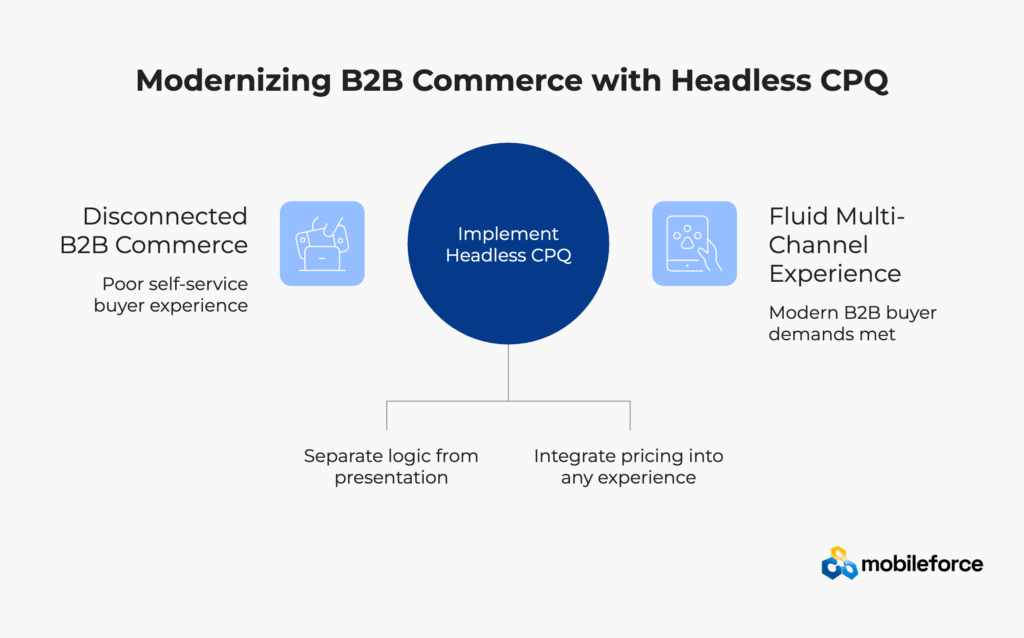
Picture this: a procurement manager at a Fortune 500 company browses your sleek, modern eCommerce site on their tablet during lunch. The interface rivals Amazon’s user experience. But when they try to configure a complex product bundle and get an instant quote? The system kicks them to a PDF form or forces them to “request a callback.”
This disconnect between front-end sophistication and backend functionality represents one of the biggest missed opportunities in B2B commerce today. According to Forrester Research, 68% of B2B buyers prefer to research and purchase independently, yet most companies still rely on sales-assisted quoting processes that can take days or weeks to complete.
The culprit? Legacy CPQ systems that were built for sales teams, not self-service buyers. These monolithic platforms couple their user interfaces tightly with their pricing engines, making it nearly impossible to create the fluid, multi-channel experiences that modern B2B buyers demand.
Enter headless CPQ—an architectural approach that separates the quote configuration engine from the presentation layer entirely. This decoupling enables businesses to plug sophisticated pricing and configuration logic into any front-end experience, from websites to mobile apps to partner portals.
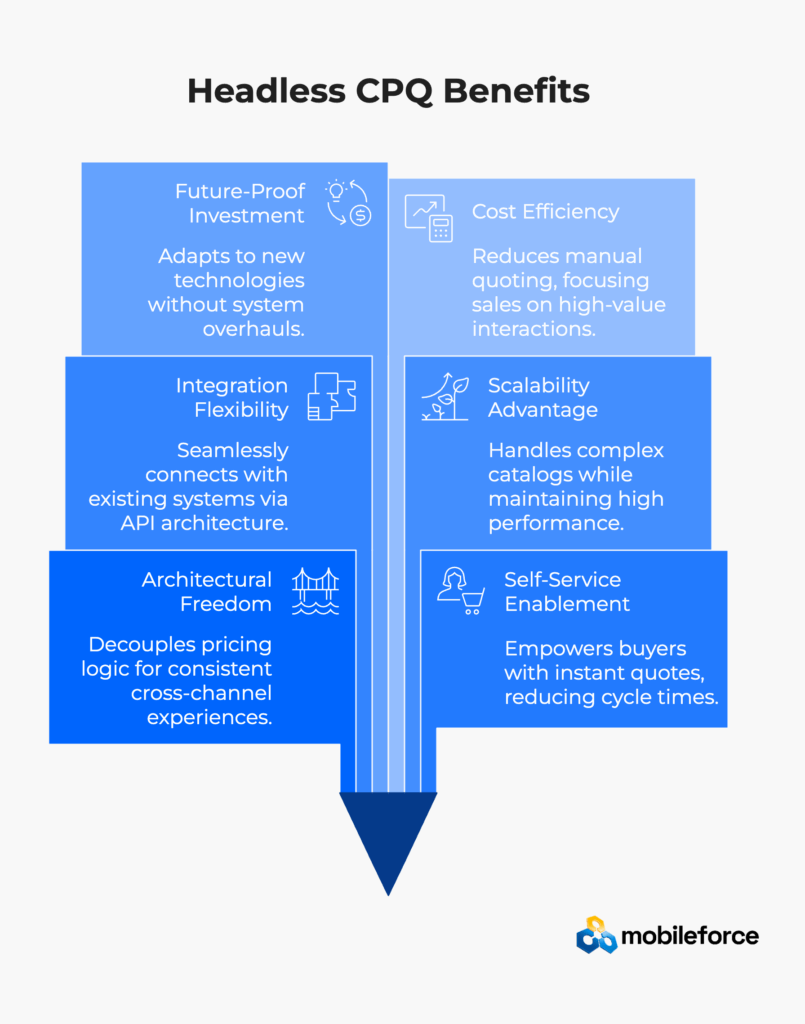
Traditional CPQ systems emerged in an era when most B2B transactions happened through direct sales conversations. These platforms typically feature tightly integrated user interfaces designed for sales representatives to walk customers through configuration processes during phone calls or in-person meetings.
Headless CPQ takes a fundamentally different approach. Instead of bundling the user interface with the configuration engine, it exposes all functionality through APIs (Application Programming Interfaces). This means the “brain” of the CPQ system—the rules engine that handles product dependencies, pricing calculations, and approval workflows—operates independently from how information is presented to users.
Think of it like the difference between a traditional restaurant where you must order through a waiter, versus a modern establishment that lets you order through their app, website, kiosk, or still talk to staff—all connected to the same kitchen operation.
The headless commerce movement, which has transformed B2C eCommerce, provides the architectural foundation. But B2B requirements add layers of complexity that consumer platforms simply can’t handle: product configurators with hundreds of options, tiered pricing structures, approval workflows, and integration with enterprise resource planning systems.
Ready to explore how headless CPQ could transform your quoting process? Schedule a personalized demo to see the architecture in action.
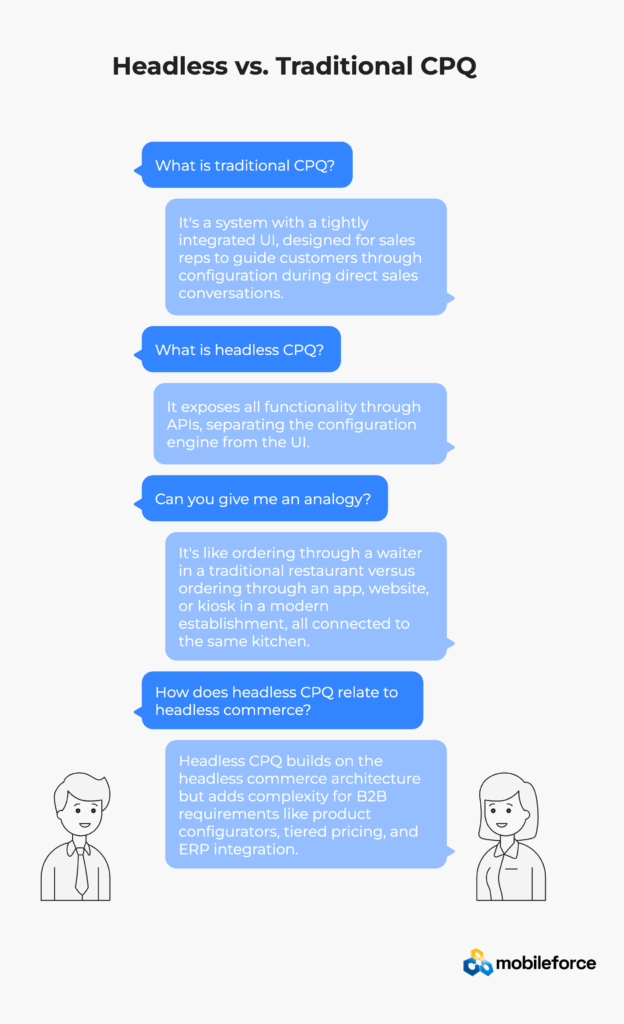
The promise of “just use Shopify Plus for B2B” sounds appealing until reality hits. B2C commerce platforms excel at what they were designed for: simple product catalogs, straightforward pricing, and streamlined checkout processes. But B2B commerce operates in a different universe entirely.
Consider a typical B2B scenario: a distributor selling industrial pumps. A single “pump” might have 47 different configuration options affecting flow rate, pressure ratings, materials, and certifications. The price isn’t just based on the selected options—it depends on the customer’s volume commitment, contract terms, geographic location, and competitive situation. Some configurations aren’t available in certain regions due to regulatory restrictions. Orders above $50,000 require approval from both the sales manager and credit department.
Now multiply this complexity across thousands of SKUs and hundreds of customers, each with unique pricing agreements and approval requirements.
The Integration Challenge
B2C platforms typically integrate with payment processors, shipping carriers, and basic inventory systems. B2B environments require connections to:
Research from the B2B eCommerce Association indicates that successful B2B digital commerce implementations typically require integration with 8-12 different enterprise systems—far beyond what consumer-focused platforms can accommodate without extensive custom development.
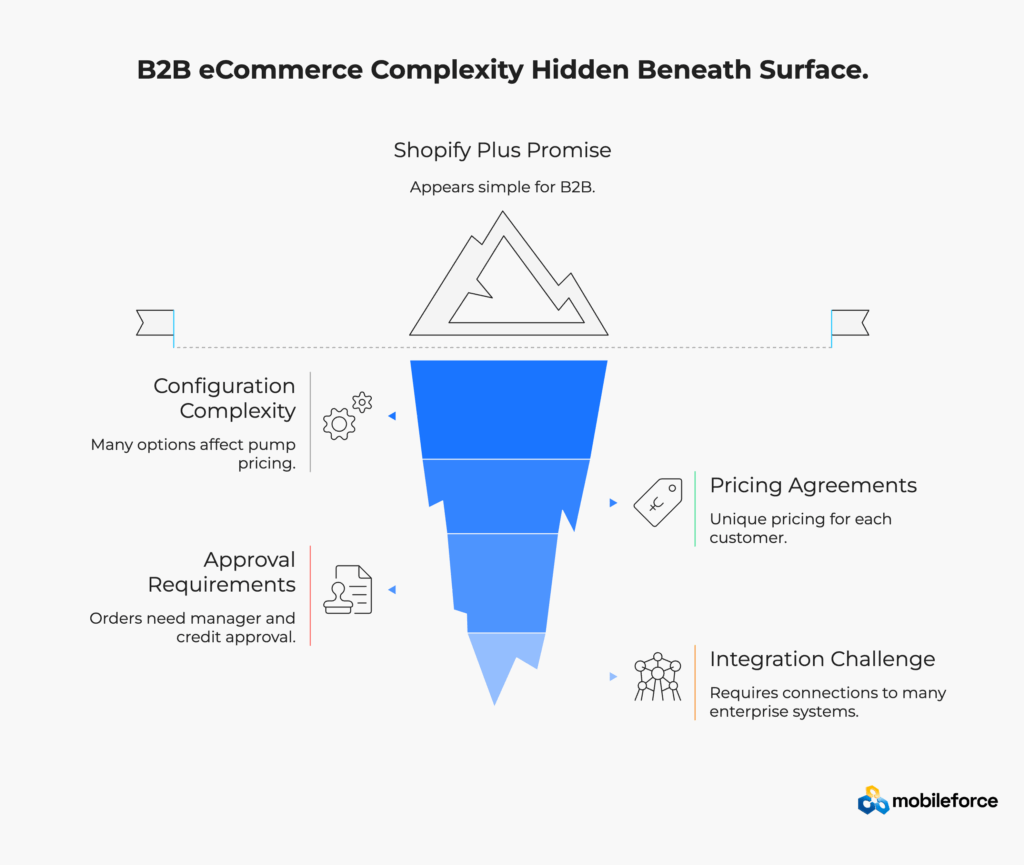
The configuration engine represents the heart of any CPQ system. In headless architectures, this logic operates as a set of microservices that can be accessed from any interface. Advanced rule engines handle complex product relationships: when a customer selects a high-pressure pump option, the system automatically restricts available materials to those rated for the specified pressure range.
Visual configurators become possible when the configuration logic is accessible via APIs. Customers can see real-time 3D renderings of their configured products, with pricing updates flowing dynamically as they make selections. The front-end presentation can be optimized for different devices and use cases while the underlying logic remains consistent.
Guided selling workflows help customers navigate complex option sets. Instead of overwhelming users with hundreds of choices upfront, intelligent questionnaires progressively narrow available options based on use case requirements. This approach reduces configuration errors while improving the buyer experience.
Pricing in B2B environments rarely follows simple rules. Volume discounts, customer-specific contract pricing, competitive situations, and margin requirements all influence final quotes. Headless CPQ systems maintain sophisticated pricing engines that can:
The API-first approach enables pricing logic to be accessed from multiple touchpoints. Whether a customer is configuring products on your website, a sales rep is preparing a proposal, or a partner is using your dealer portal, the same pricing rules apply consistently.
Curious about implementing dynamic pricing rules in your organization? Connect with our CPQ specialists to discuss your specific requirements.
B2B transactions often require multiple levels of approval before completion. Headless CPQ systems include workflow engines that route quotes through appropriate approval chains based on configurable business rules. A $100,000 quote might require sales manager approval, while deals involving custom engineering trigger technical review processes.
Compliance requirements add another layer of complexity. Export regulations, industry certifications, and regional restrictions must be enforced during the configuration process. The rules engine can prevent invalid combinations before quotes are generated, reducing delays and legal risks.
Audit trails become critical in regulated industries. Every configuration change, pricing adjustment, and approval decision is logged with timestamps and user identification. This documentation supports compliance reporting and provides visibility into quote-to-cash processes.
Modern buyers expect professional quote documents delivered instantly. Headless CPQ systems generate quotes through template engines that can produce PDF documents, interactive web presentations, or data feeds for downstream systems.
Version control becomes important as quotes evolve through negotiation processes. The system maintains complete quote histories while enabling easy comparison between versions. Digital signature integration streamlines approval processes and accelerates deal closure.
Quote-to-order conversion connects CPQ outputs directly to order management systems. Approved quotes become orders automatically, reducing manual data entry and eliminating transcription errors that plague traditional processes.
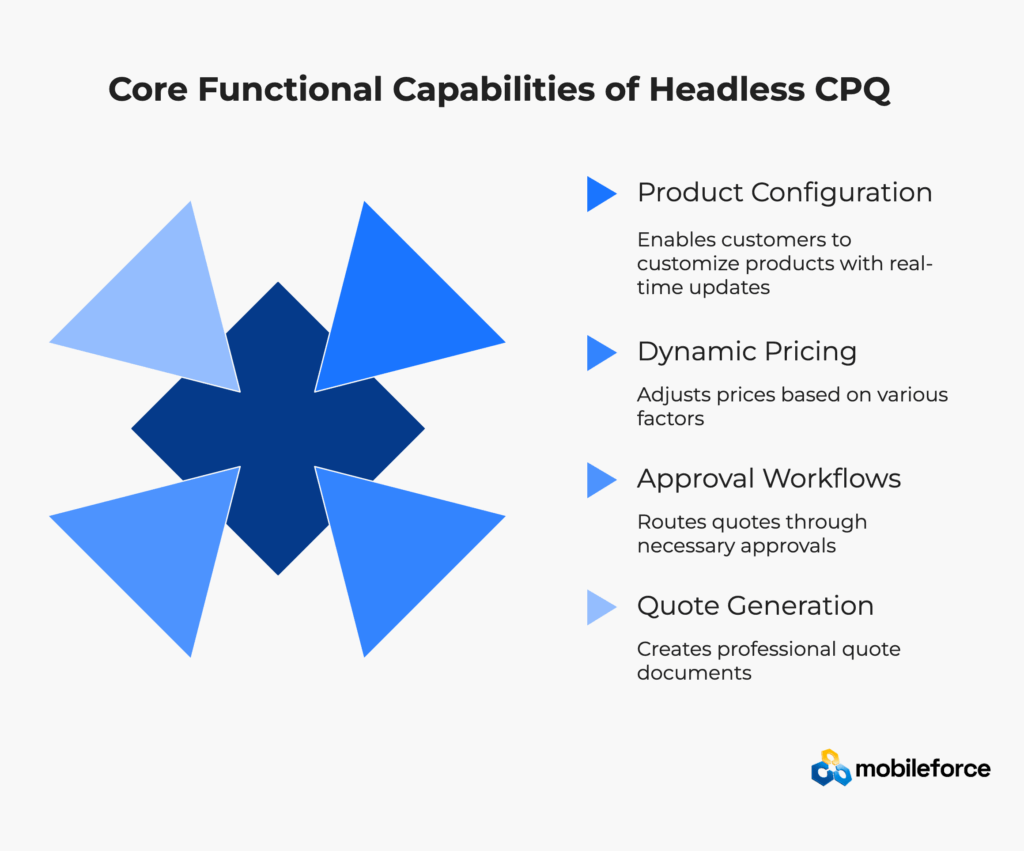
Capability | Traditional CPQ | Headless CPQ |
User Interface | Fixed, vendor-provided UI | Any interface via APIs |
Integration Complexity | Proprietary connectors | Standard REST/GraphQL APIs |
Customization Scope | Limited to vendor parameters | Full control over presentation |
Mobile Experience | Often poor or non-existent | Native mobile optimization possible |
Upgrade Impact | UI changes affect all users | Backend upgrades don’t affect UX |
Multi-Channel Support | Single channel focus | Consistent across all channels |
Development Resources | Vendor-specific skills required | Standard web development skills |
Successful headless CPQ implementations typically follow microservices architecture patterns. Core services handle specific functions: product configuration, pricing calculation, approval routing, and document generation. An API gateway coordinates communication between services and external systems.
Configuration Service: Manages product catalogs, option dependencies, and business rules. This service validates customer selections and ensures only compatible combinations are allowed.
Pricing Service: Calculates prices based on configured products, customer information, and applicable discounts. Real-time pricing requires high-performance caching and efficient rule evaluation.
Workflow Service: Routes quotes through approval processes based on configurable business rules. Integration with identity management systems enables role-based approval routing.
Document Service: Generates quote documents in various formats. Template management allows customization for different customer segments or regional requirements.
Integration Service: Orchestrates data exchange with external systems. This includes real-time inventory checks, customer credit verification, and order placement.
Cloud-native deployments offer scalability advantages but require careful attention to data residency requirements. Container orchestration platforms like Kubernetes enable automatic scaling during peak usage periods.
Hybrid deployment models allow sensitive data to remain on-premises while leveraging cloud services for user-facing functionality. This approach addresses compliance requirements while enabling global accessibility.
Phased rollouts reduce implementation risk. Starting with a subset of products or customer segments allows teams to validate the architecture before full-scale deployment.
Looking to design your headless CPQ architecture? Schedule a consultation with our technical team to review your specific requirements.
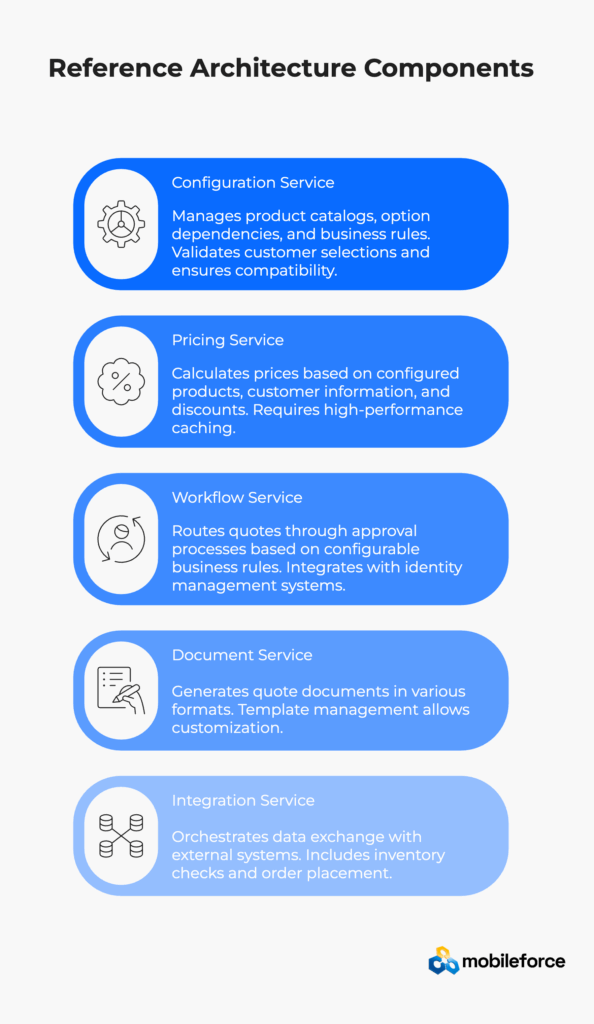
Product catalogs in B2B environments often suffer from inconsistent data quality. Incomplete technical specifications, outdated pricing information, and unclear product relationships create significant challenges for automated configuration systems.
Mitigation Approach: Implement data governance processes before CPQ deployment. Product information management (PIM) systems provide centralized catalogs with workflow-based updates. Regular data audits identify and correct quality issues.
Enterprise environments typically include legacy systems with limited API capabilities. Custom integration development can consume significant project resources and create ongoing maintenance overhead.
Mitigation Approach: Prioritize integrations based on business impact. Start with critical systems like ERP and CRM, then add additional connections incrementally. Consider middleware platforms that provide pre-built connectors for common enterprise applications.
Complex configuration rules and pricing calculations can create performance bottlenecks as product catalogs and customer bases grow. Real-time pricing requirements add additional pressure on system responsiveness.
Mitigation Approach: Implement intelligent caching strategies for frequently accessed data. Pre-calculate pricing for common configurations during off-peak hours. Use content delivery networks (CDNs) to serve static assets globally.
Sales teams often resist new technologies that change established processes. Concerns about system reliability and feature availability can create adoption barriers.
Mitigation Approach: Involve sales teams in system design and testing phases. Provide comprehensive training programs that demonstrate clear benefits. Implement gradual rollouts that allow users to become comfortable with new functionality.
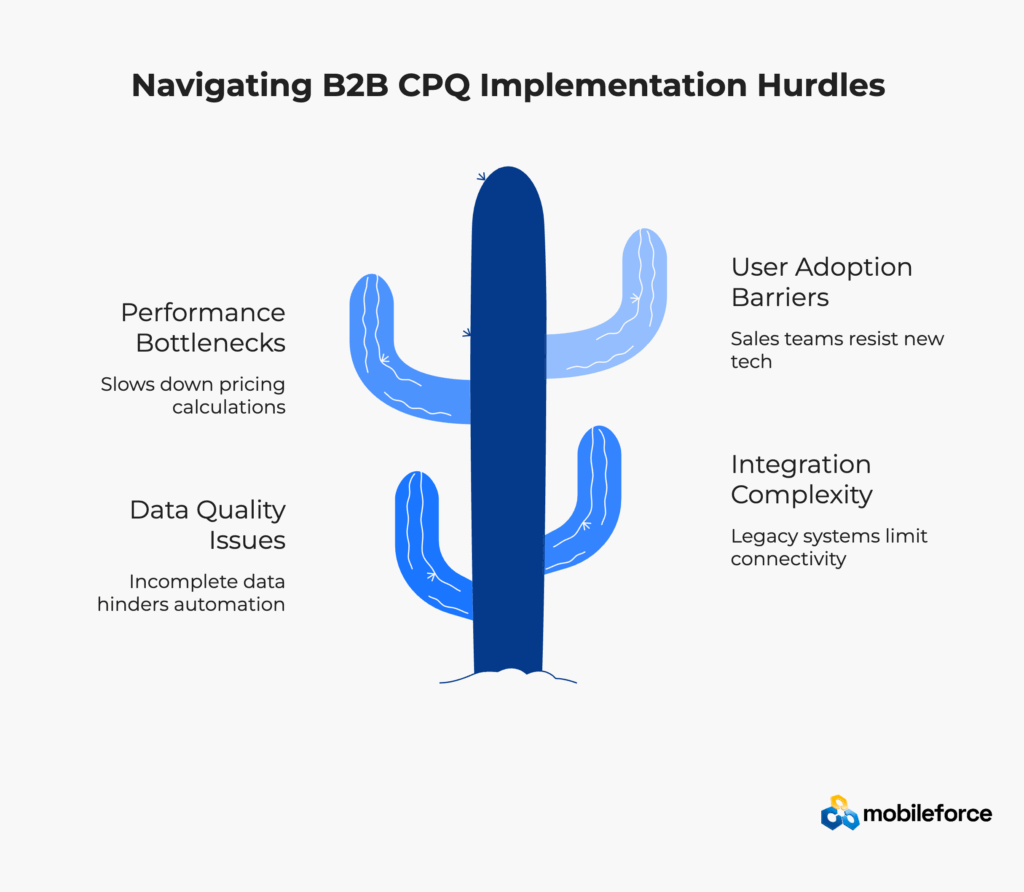
Manual quoting processes consume significant sales resources. According to Salesforce, sales representatives spend only 34% of their time actually selling—the rest is consumed by administrative tasks including quote preparation.
Automated quoting reduces this overhead substantially. Complex configurations that previously required hours of sales engineer time can be completed by customers in minutes. This efficiency gain allows sales teams to focus on high-value activities like relationship building and consultative selling.
Error reduction provides additional cost benefits. Manual quote preparation introduces transcription errors, incorrect pricing, and invalid product combinations. Automated systems eliminate these issues while providing consistent, accurate quotes.
Self-service quoting capabilities expand market reach by enabling customers to evaluate options outside business hours. International customers particularly benefit from time zone independence.
Faster quote turnaround improves win rates. Research from InsideSales.com indicates that companies responding to inquiries within one hour are seven times more likely to qualify leads than those responding after two hours.
Cross-selling and upselling opportunities increase through intelligent recommendations. Configuration engines can suggest complementary products based on customer selections and usage patterns.
Manufacturing: Custom equipment configurators enable customers to specify exact requirements while ensuring manufacturability. Integration with production planning systems provides accurate delivery estimates.
Distribution: Multi-location inventory visibility ensures quote accuracy while optimizing fulfillment costs. Customer-specific pricing agreements are enforced automatically.
Technology Services: Complex service offerings with multiple components benefit from guided selling workflows that ensure all necessary elements are included in quotes.
Want to quantify the potential ROI for your organization? Request a business case analysis tailored to your specific situation.
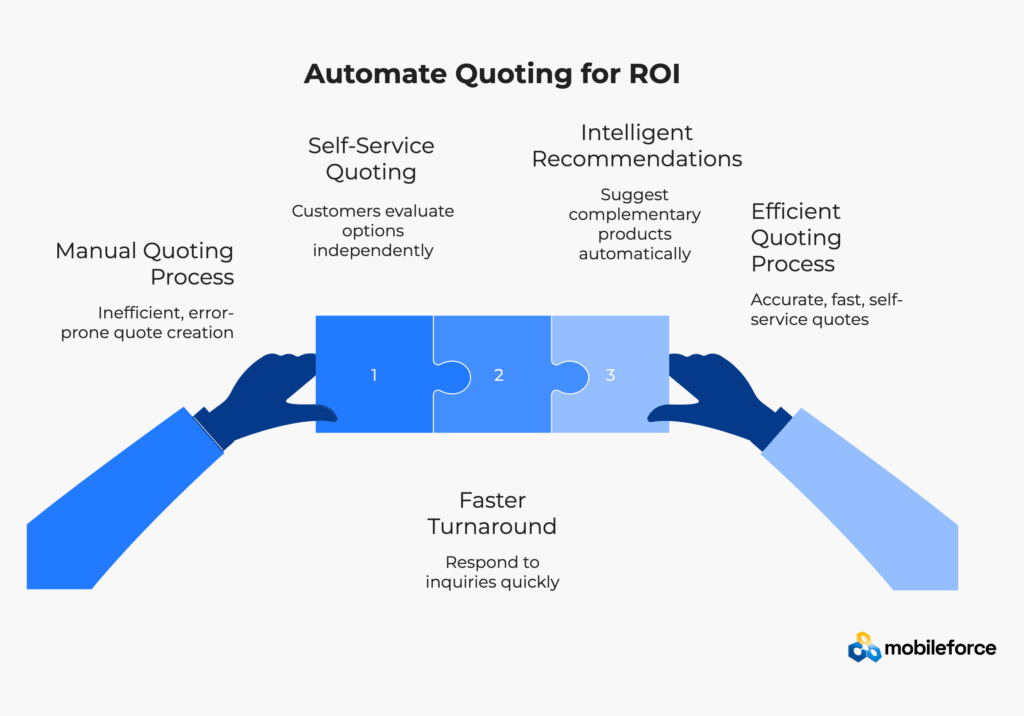
Traditional CPQ vendors like Salesforce CPQ, Oracle CPQ, and SAP CPQ were designed for sales team productivity rather than customer self-service. These platforms typically feature:
API-first architectures provide flexibility that legacy platforms can’t match. Development teams can create custom user experiences using familiar web technologies rather than learning proprietary configuration languages.
Cloud-native designs enable elastic scaling during peak usage periods. Traditional platforms often require expensive hardware upgrades to handle increased load.
Vendor independence reduces long-term risk. Headless architectures allow organizations to change technology providers without losing their user interface investments.
When assessing CPQ platforms, consider these critical factors:
API Maturity: Comprehensive REST or GraphQL APIs with complete functionality access Documentation Quality: Clear, comprehensive documentation with code examples Integration Ecosystem: Pre-built connectors for common enterprise applications
Scalability Architecture: Cloud-native design with automatic scaling capabilities Upgrade Path: Non-disruptive update processes that preserve customizations Support Model: Responsive technical support with solution expertise
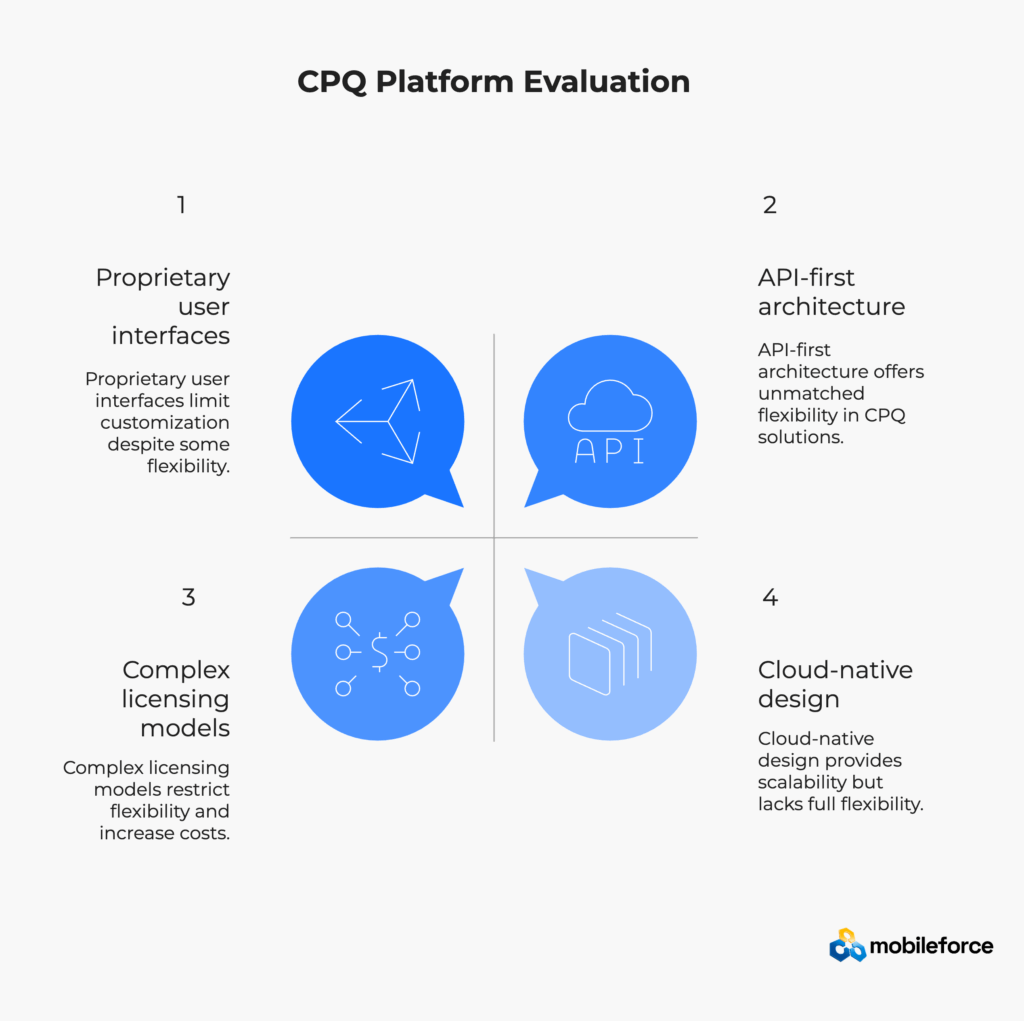
Successful CPQ implementations begin with thorough discovery and planning phases. Product catalog analysis identifies data quality issues and complex configuration scenarios that require special attention.
Business process mapping reveals current quote-to-cash workflows and highlights optimization opportunities. Understanding approval hierarchies, pricing approval authorities, and integration touchpoints prevents scope creep during implementation.
Stakeholder alignment ensures project success. Sales, marketing, IT, and finance teams all have different requirements and success metrics for CPQ systems.
Starting with a limited product set or customer segment reduces implementation risk while providing early validation of the chosen approach. Pilot programs should include:
User adoption ultimately determines project success. Comprehensive training programs should address different user roles and use cases:
Sales Teams: Focus on efficiency gains and improved customer experience capabilities Customers: Emphasize self-service benefits and guided selling features
IT Teams: Provide technical training on system administration and troubleshooting Management: Highlight reporting capabilities and business process improvements
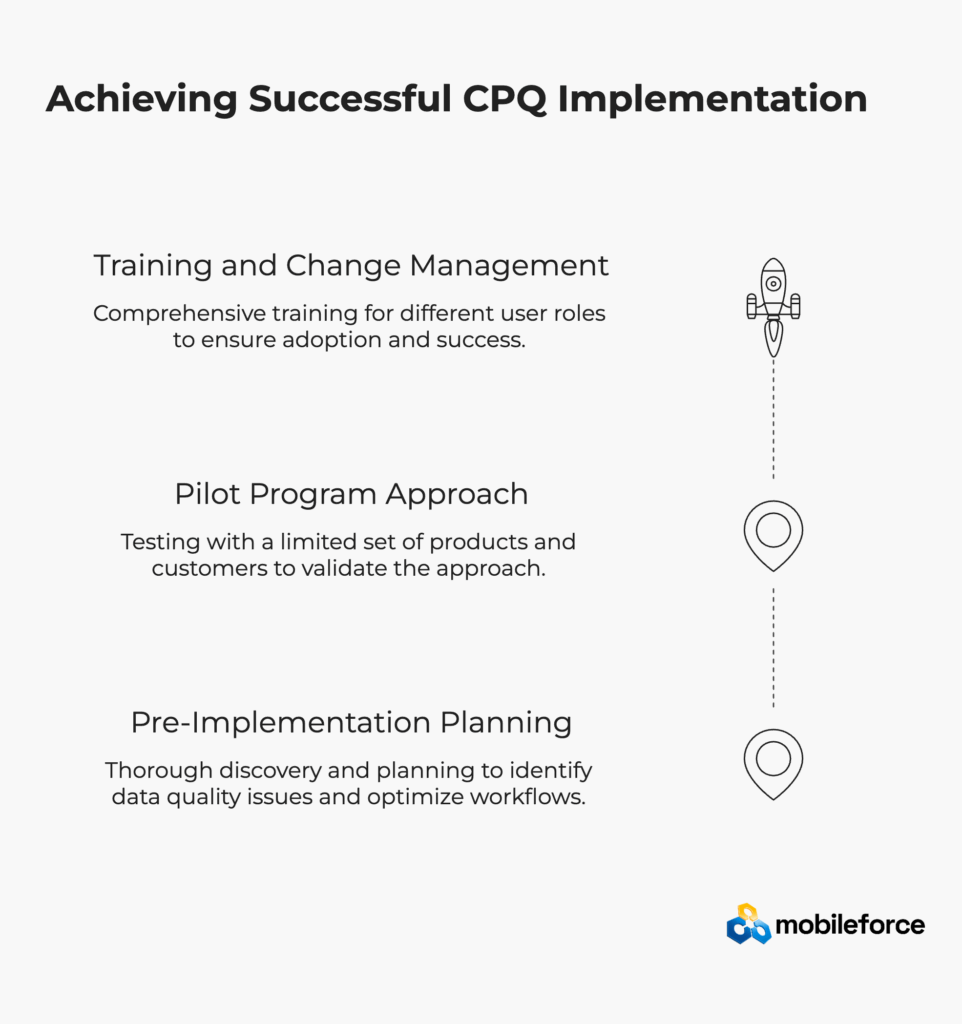
Implementing headless CPQ requires careful planning and expert guidance. The complexity of B2B requirements demands deep understanding of both technical architecture and business processes.
Start by assessing your current quoting processes and identifying the biggest pain points. Are sales teams spending too much time on administrative tasks? Are customers frustrated by slow quote turnaround times? Do complex products require extensive sales engineer involvement?
Next, evaluate your technical infrastructure and integration requirements. Understanding existing system capabilities and limitations helps inform architecture decisions and implementation timelines.
Consider partnering with experienced implementation teams who understand both the technical and business aspects of CPQ deployments. Their expertise can help you avoid common pitfalls while accelerating time to value.
Ready to begin your headless CPQ journey? Contact our team to discuss your specific requirements and develop a customized implementation plan.
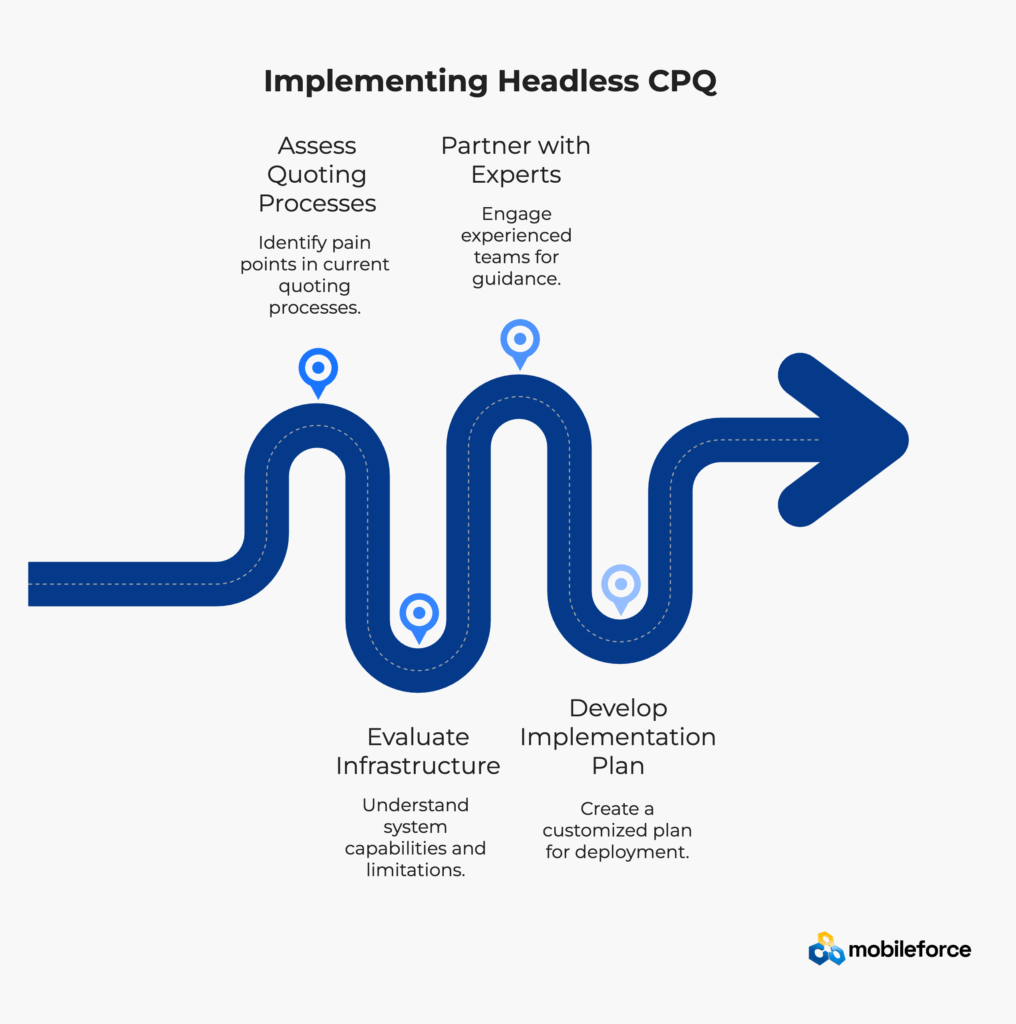
A: Not necessarily. While enterprise-scale implementations can be complex, many headless CPQ platforms offer scaled-down solutions appropriate for smaller organizations. The key is matching system capabilities to your specific requirements rather than assuming bigger is always better. Companies with even modest product complexity often benefit from automated quoting capabilities.
A: Embedded CPQ solutions typically offer basic configuration and pricing capabilities within existing commerce platforms. Headless CPQ provides much deeper functionality including complex rule engines, approval workflows, and enterprise system integration. The architectural separation also enables greater customization and future flexibility.
A: Yes, this is one of the primary advantages of headless architecture. Your existing front-end investments are preserved while adding sophisticated CPQ capabilities through API integration. This approach minimizes disruption to established customer experiences while adding powerful new functionality.
A: API versioning strategies allow backward compatibility during upgrade cycles. Your front-end systems continue working with existing API versions while you gradually migrate to newer functionality. This approach eliminates the “big bang” upgrade disruptions common with traditional CPQ platforms.
A: Headless systems can provide enhanced security through API-based access controls and encrypted communication channels. Compliance requirements are often easier to address since data processing logic is centralized in backend services while presentation layers remain separate. However, proper implementation requires careful attention to authentication, authorization, and data encryption practices.
A: Implementation timelines vary significantly based on product complexity, integration requirements, and customization needs. Simple implementations might be completed in 3-4 months, while complex enterprise deployments can take 12-18 months. Phased approaches often provide the best balance between functionality and time-to-value.
Transform your B2B quoting process with modern headless CPQ architecture. Schedule a consultation today to explore how this approach can accelerate your digital commerce initiatives while reducing operational overhead.